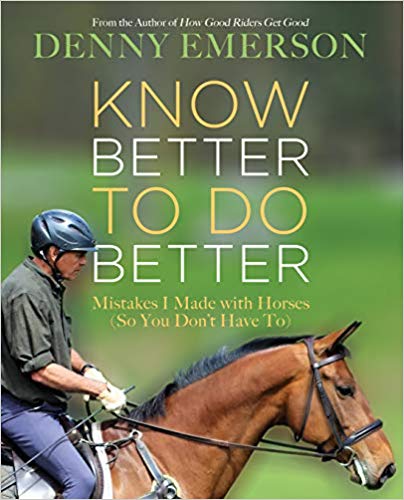By Denny Emerson
Trafalgar Square Books, 2018, 224 pages

I’ve been a fan of the Tamarack Hill Farm Facebook page for a long time, so I was excited to see the release of owner Denny Emerson’s new book sharing his insights on horsemanship, “Know Better to Do Better.”
Denny Emerson has been a force in the equestrian world for more than a half-century. He started competing at the age of 12 in gymkhana and since then has ridden in eventing, competitive trail riding, and steeplechase. Along the way, he has developed a very human take on horsemanship, devoting himself to continuous learning over a long career. He’s a champion for Off Track Thoroughbreds (OTTBs) and is a Vermonter with a soft spot for the Morgan horse. A prolific writer, he wrote the forward to Sally Swift’s Centered Riding and a regular contributor to “Chronicle of the Horse”. He previously wrote How Good Riders Get Good: Daily Choices That Lead to Success in Any Equestrian Sport.
Now we have Know Better To Do Better: Mistakes I Made With Horses So You Don’t Have To, a compilation of Denny Emerson’s learnings over the years. The book is grouped into chapters covering broad topics covering aspects of both horse and rider, such as horse selection, management and training, and rider emotional makeup and character, physical traits and knowledge. While Emerson is an accomplished rider and trainer, the teachings are not so much about techniques specific to any particular discipline, but instead cover philosophical discussions about each topic, aimed at achieving a happy outcome for both horse and rider. He uses his own experiences as proof that you don’t need to follow a straight line to end up at the top of your field. His own horsemanship career started with riding Western on a pony, graduating to a horse, getting interested in competitive trail riding and eventually migrating to eventing.
Each chapter includes a discussion of the chapter topic, with practical advice drawn from Emerson’s long career. Within each chapter are a number of sidebars, usually highlighting Emerson’s experiences with a particular horse—some history, the challenges faced by horse and rider, how they were (or weren’t) resolved, and how the situation could have been handled better if he had known then what he knows now.
Emerson’s approach is no-nonsense. He’s been focused and goal-driven for his riding career, and it comes through in the book. Still, he does acknowledge human frailty. When I was scanning the table of contents, I noticed the sub-heading of Chapter 4 (A Rider’s Emotional Makeup and Character Traits), titled “Weather Wimps and Other Whiney Creatures,” and made a mental note to pay particular attention to that one because it seemed to be directed to me, and I figured I needed a smack-down. I finally opened to that page and was pleasantly surprised to find that Emerson “never missed a chance to whine and complain about the weather.” Furthermore, to quote, “Personally, I think it’s a mark of flawed character to be stoic and brave about adverse weather conditions.” Finally, a horse person with his brains still intact! Of course, nowhere in this section does he indicate that, while it’s fine to complain about the weather, it’s also OK to sit it out until the weather improves. Nope. Get your butt out there, put on rain gear, and feel free to snivel about the conditions, while you are still doing the work.
Another quote from the same chapter: “So, start, don’t be afraid of messing up, and see where it takes you. Don’t dither, dabble around, fuss, question, and procrastinate.” Good advice for any endeavor! And largely a theme of this book. Commit yourself to learning about your horsemanship passion. You will make mistakes, as Emerson has. As long as you learn from them, that’s fine. In fact, this is how we all learn.
In summary, this is a warm, anecdote-filled collection of learnings over nearly 70 years from someone who, at least in the beginning, has largely bootstrapped himself up. He expects the same attitude from the reader—do the best you know how until you know better, and always be looking for better ways to do things to get a better outcome for both you and your horse. This is the soul of horsemanship.
Like the review? Click the link below to buy the book on Amazon.
